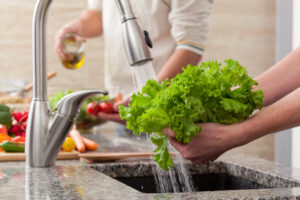
Not necessarily. Although Chinese researchers have suggested that roughly half of coronavirus patients have complained about diarrhea and other digestive issues, it is not a surefire way to identify the disease.
This is especially true if you’ve adopted this popular yet unfounded “protective measure.”
For years, if not your entire life, you’ve likely washed your fruits and vegetables with little more than a good rinse under cold water. For some items, like potatoes, you may have used a scrub. But these days, people are washing food in soapy water.
If you’ve got an upset stomach or experience indigestion after eating, this practice could be the reason.
For one thing, your kitchen sink is likely the dirtiest place in your home. According to experts, bathing food exposes them to cross-contamination with the numerous and potentially sickening pathogens.
Further, there is plenty of evidence to suggest that dish soap can lead to indigestion in humans. So, if you’ve been washing fruits and vegetables in soapy water and experiencing diarrhea, vomiting, or other forms of indigestion, this practice could be the culprit.
When you bring groceries into the house, the best thing to do is simply wash your hands after each handling, including before and after eating. There is certainly no harm in washing or disinfecting packages, but it is also unclear if there is any benefit.
The most important thing is to wash your hands for 20 seconds with soap and lukewarm water regularly. When it comes to produce, a thorough rinse under cold water should suffice.
Sticking to these practices should allow you to avoid any food-related indigestion. If you do ingest dish soap, drink some water to see if that helps. If you consumed a lot, call your doctor.




